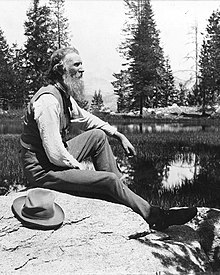
Back جون موير Arabic جون موير ARZ جان مویر AZB Джон Мьюр BA John Muir BCL John Muir BR John Muir Catalan John Muir Czech John Muir (naturforsker) Danish John Muir German
John Muir | |
|---|---|
 Muir c. 1902 | |
| Born | April 21, 1838 Dunbar, Scotland |
| Died | December 24, 1914 (aged 76) Los Angeles, California, U.S. |
| Alma mater | University of Wisconsin–Madison |
| Occupations |
|
| Spouse |
Louisa Strentzel
(m. 1880–1905) |
| Children | 2 |
| Signature | |
John Muir (/mjʊər/ MURE; April 21, 1838 – December 24, 1914),[1] also known as "John of the Mountains" and "Father of the National Parks",[2] was a Scottish-born American[3][4]: 42 naturalist, author, environmental philosopher, botanist, zoologist, glaciologist, and early advocate for the preservation of wilderness in the United States.
His books, letters and essays describing his adventures in nature, especially in the Sierra Nevada, have been read by millions. His activism helped to preserve the Yosemite Valley and Sequoia National Park, and his example has served as an inspiration for the preservation of many other wilderness areas. The Sierra Club, which he co-founded, is a prominent American conservation organization. In his later life, Muir devoted most of his time to his wife and the preservation of the Western forests. As part of the campaign to make Yosemite a national park, Muir published two landmark articles on wilderness preservation in The Century Magazine, "The Treasures of the Yosemite" and "Features of the Proposed Yosemite National Park"; this helped support the push for US Congress to pass a bill in 1890 establishing Yosemite National Park.[5] The spiritual quality and enthusiasm toward nature expressed in his writings has inspired readers, including presidents and congressmen, to take action to help preserve large nature areas.[6]
John Muir has been considered "an inspiration to both Scots and Americans".[7] Muir's biographer, Steven J. Holmes, believes that Muir has become "one of the patron saints of twentieth-century American environmental activity", both political and recreational. As a result, his writings are commonly discussed in books and journals, and he has often been quoted by nature photographers such as Ansel Adams.[8] "Muir has profoundly shaped the very categories through which Americans understand and envision their relationships with the natural world", writes Holmes.[9]
Muir was noted for being an ecological thinker, political spokesman, and environmental advocate, whose writings became a personal guide into nature for many people, making his name "almost ubiquitous" in the modern environmental consciousness. According to author William Anderson, Muir exemplified "the archetype of our oneness with the earth",[10] while biographer Donald Worster says he believed his mission was "saving the American soul from total surrender to materialism".[11]: 403 On April 21, 2013, the first John Muir Day was celebrated in Scotland, which marked the 175th anniversary of his birth, paying homage to the conservationist.
- ^ "John Muir". Encyclopedia of World Biography. Retrieved September 25, 2010.
- ^ Miller, Barbara Kiely (2008). John Muir. Gareth Stevens. p. 10. ISBN 978-0836883183.
- ^ Kennedy White, Kim, ed. (2013). America Goes Green: An Encyclopedia of Eco-Friendly Culture in the United States. Santa Barbara, California: ABC-CLIO. p. xxiii.
John Muir (1838–1914) was a Scottish-born American citizen
- ^ Cite error: The named reference
Foxwas invoked but never defined (see the help page). - ^ Library of Congress. Documentary Chronology of Selected Events in the Development of the American Conservation Movement, 1847-1920 Archived November 5, 2020, at the Wayback Machine.
- ^ "The Life and Contributions of John Muir". Sierra Club. Archived from the original on March 31, 2014. Retrieved October 23, 2009.
- ^ "John Muir: The Life and Times". Scotland.org. April 27, 2015. Archived from the original on October 19, 2022. Retrieved March 13, 2018.
- ^ Adams, Ansel (2002). America's Wilderness: the Photographs of Ansel Adams, with the Writings of John Muir. Philadelphia: Courage Books. ISBN 978-0762413904.
- ^ Cite error: The named reference
Holmeswas invoked but never defined (see the help page). - ^ Anderson, William (1998). Green Man: The Archetype of Our Oneness with the Earth. Compass Equestrian Limited. ISBN 978-0951703816.
- ^ Worster, Donald (2008). Passion for Nature. Oxford University Press, USA. ISBN 978-0195166828.